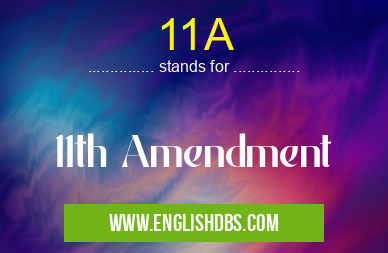What does 11A mean in LAW & LEGAL
11A is an abbreviation for the 11th Amendment to the United States Constitution. Adopted in 1795, it addresses the issue of lawsuits filed against states by citizens of other states or foreign countries.

11A meaning in Law & Legal in Governmental
11A mostly used in an acronym Law & Legal in Category Governmental that means 11th Amendment
Shorthand: 11A,
Full Form: 11th Amendment
For more information of "11th Amendment", see the section below.
Meaning of 11A
The 11th Amendment states that:
- No state shall be sued by citizens of another state, or by citizens or subjects of any foreign state.
This means that individuals cannot file lawsuits against states in federal court if the plaintiff is not a citizen of the state being sued. Additionally, foreign citizens or governments cannot sue states in federal court.
Exceptions to 11A
There are two exceptions to the 11th Amendment:
- Suits against states by the federal government
- Suits against states that have consented to being sued
Purpose of 11A
The 11th Amendment was adopted to protect states from being sued in federal court by non-citizens. This was seen as necessary to prevent the federal government from using its judicial power to interfere in state affairs.
Impact of 11A
The 11th Amendment has had a significant impact on the relationship between the federal government and the states. It has limited the ability of individuals and foreign entities to sue states, and has protected states from federal judicial interference.
Essential Questions and Answers on 11th Amendment in "GOVERNMENTAL»LAW"
What is the 11th Amendment?
The 11th Amendment to the United States Constitution prevents citizens from suing states in federal court without the state's consent.
When was the 11th Amendment adopted?
The 11th Amendment was adopted on February 7, 1795, as part of the Bill of Rights.
Why was the 11th Amendment passed?
The 11th Amendment was passed to overrule the Supreme Court's decision in Chisholm v. Georgia (1793), which ruled that states could be sued in federal court. This decision upset many states, who feared that they would be subject to lawsuits from their own citizens as well as citizens of other states.
What are the exceptions to the 11th Amendment?
There are two main exceptions to the 11th Amendment:
- When a state waives its immunity and consents to being sued in federal court.
- When a lawsuit is brought against a state by the federal government.
What are the implications of the 11th Amendment?
The 11th Amendment has a significant impact on the ability of citizens to sue states. It means that, in general, citizens cannot sue states in federal court for damages. However, there are some exceptions to this rule, such as when a state waives its immunity or when a lawsuit is brought by the federal government.
Final Words: The 11th Amendment is an important part of the United States Constitution. It protects states from being sued in federal court by non-citizens, and it ensures that the federal government does not use its judicial power to interfere in state affairs.
